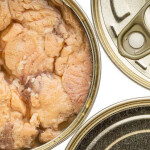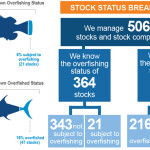The World Trade Organization on Tuesday ruled again that the United States is discriminating against Mexico tuna suppliers regarding compliance requirements for U.S. dolphin-safe labels affixed to canned tuna. It’s the latest development in a trade dispute that spans nearly a quarter century.
“We recommend that the dispute settlement body request the United States bring its measure, which we have found to be inconsistent with (the WTO rules) ... into conformity with its obligations," the WTO panel said in its final report. WTO has ruled in favor of Mexico three times.
Mexico’s economy ministry applauded the decision, and has long argued that the U.S. policy unfairly limits its share of the massive U.S. imported canned tuna market. The United States must appeal the ruling, which it will likely do, or agree on a settlement with Mexico and adjust requirements for the dolphin-safe labels.
Environmental groups have long supported the U.S. policy, which is intentionally strict and stronger than most international tuna-trade agreements, say proponents.
Canners must submit reports about all the tuna in their facilities each month, including data about dolphin interactions, capture areas, trip dates and quantity. Any vessel with a carrying capacity of more than 400 short tons must have an observer on board.
The fishing method at issue is known as “fishing on dolphins,” a practice in which fishing vessels track tuna by following leaping dolphins, known to swim in proximity to tunas, particularly in the area in the eastern tropical Pacific Ocean in which the Mexican fleet operates. The dolphin-safe label is a certification that no nets were intentionally set on dolphins in the set in which the tuna was caught; and no dolphins were killed or seriously injured in the sets in which the tuna was caught.
“The dolphin-safe tuna label has saved millions of dolphins from drowning in tuna nets. It should not be weakened due to trade bias and false claims by Mexico,” David Phillips, executive director of Earth Island Institute in Berkeley, Calif., told SeaFood Business in 2012.
Earth Island Institute guided the United States policy and dolphin-safe tuna labels, which were required beginning in 1990. Some groups contend that the dolphin-safe label lacks scientific rigor.
“The United States’ ‘dolphin-safe’ label is backed by a single economically self-interested animal rights group through a combination of greenwashing and bullying tactics,” said the Campaign for Eco-Safe Tuna. “It is an unregulated, unverified, non-existent tracking system that allows companies to ‘self-certify’ that their fishing practices do not harm dolphins despite scientific proof that they do.”
The group argues that 96 percent of tuna in the U.S. marketplace that is not captured in the eastern tropical Pacific is eligible for the dolphin-safe label with “virtually no proof that it was captured without harm to dolphins.”





